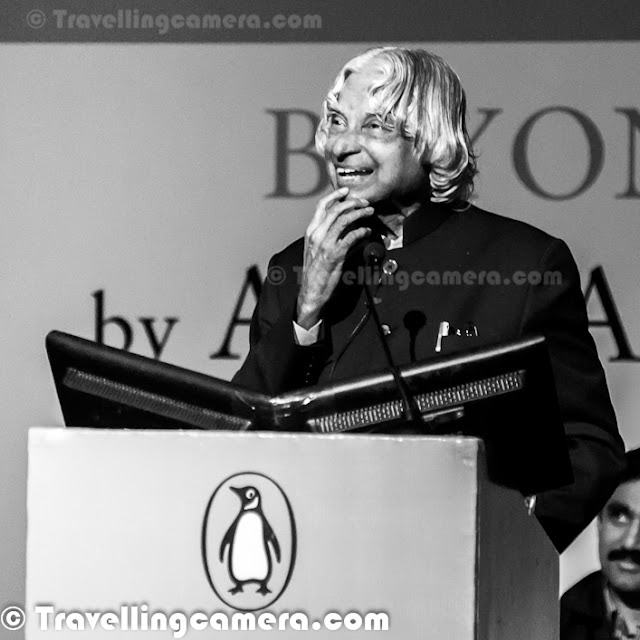Few weeks back we met Dr A P J Abdul Kalam at India Habitat Center, where he had come for delivering annual talk for Penguin India. All of these photographs are clicked during the same event. Let's check out this Photo Journey to know about Dr Kalam and his journey into different ventures so far.
At IHC, he delivered the annual lecture on BEYOND 2020 which is his vision for India as Economically developed country.
Kalam was elected the President of India in 2002, defeating Lakshmi Sahgal and was supported by both the Indian National Congress and the Bharatiya Janata Party, the major political parties of India. He is currently a visiting professor at Indian Institute of Management Ahmedabad and Indian Institute of Management Indore, Chancellor of the Indian Institute of Space Science and Technology Thiruvananthapuram, a professor of Aerospace Engineering at Anna University (Chennai), JSS University (Mysore) and an adjunct/visiting faculty at many other academic and research institutions across India.
There are many special things that people hardly know about. Dr A. P. J. Abdul Kalam's 79th birthday was recognized as World Students' Day by United Nations. He has also received honorary doctorates from 40 universities.The Government of India has honored him with the Padma Bhushan in 1981 and the Padma Vibhushan in 1990 for his work with ISRO and DRDO and his role as a scientific advisor to the Government. In 1997, Dr Kalam received India's highest civilian honour, the Bharat Ratna, for his immense and valuable contribution to the scientific research and modernization of defense technology in India.
Dr Kalam has authored various books including -
Developments in Fluid Mechanics and Space Technology
India 2020: A Vision for the New Millennium
Wings of Fire
Ignited Minds: Unleashing the Power Within India
The Luminous Sparks
Mission India
Inspiring Thoughts
Indomitable Spirit
Envisioning an Empowered Nation
You Are Born To Blossom
Turning Points: A journey through challenges
Inspiring Thoughts
Indomitable Spirit
Envisioning an Empowered Nation
You Are Born To Blossom
Turning Points: A journey through challenges
After graduating from Madras Institute of Technology (MIT – Chennai) in 1960, Kalam joined Aeronautical Development Establishment of Defense Research and Development Organization (DRDO) as a chief scientist. Kalam started his career by designing a small helicopter for the Indian Army, but remained unconvinced with the choice of his job at DRDO. Kalam was also part of the INCOSPAR committee working under Vikram Sarabhai, the renowned space scientist. In 1969, Kalam was transferred to the Indian Space Research Organization (ISRO) where he was the project director of India's first indigenous Satellite Launch Vehicle (SLV-III) which successfully deployed the Rohini satellite in near earth orbit in July 1980. Joining ISRO was one of Kalam's biggest achievements in life and he is said to have found himself when he started to work on the SLV project. Kalam first started work on an expandable rocket project independently at DRDO in 1965. In 1969, Kalam received the government's approval and expanded the program to include more engineers
Dr Abdul Kalam served as the 11th President of India, succeeding K. R. Narayanan. He won the 2002 presidential election with an electoral vote of 922,884, surpassing 107,366 votes won by Lakshmi Sahgal. He served from 25 July 2002 to 25 July 2007. On 10 June 2002, the National Democratic Alliance (NDA) which was in power at the time, expressed to the leader of opposition, Indian National Congress president Sonia Gandhi that they would propose Kalam for the post of President. The Samajwadi Party and the Nationalist Congress Party backed his candidacy. After the Samajwadi Party announced its support for him, President K. R. Narayanan chose not to seek a second term in office and hence left the field clear for Kalam to become the 11th President of India.
In his Book India 2020, Dr Kalam strongly advocates an action plan to develop India into a knowledge superpower and a developed nation by the year 2020. He regards his work on India's nuclear weapons program as a way to assert India's place as a future superpower. It was reported that, there was a considerable demand in South Korea for translated versions of books authored by him. Dr Kalam continues to take an active interest in other developments in the field of science and technology. He has proposed a research program for developing bio-implants. He is a supporter of Open Source over proprietary solutions and believes that the use of free software on a large scale will bring the benefits of information technology to more people.









.jpg)